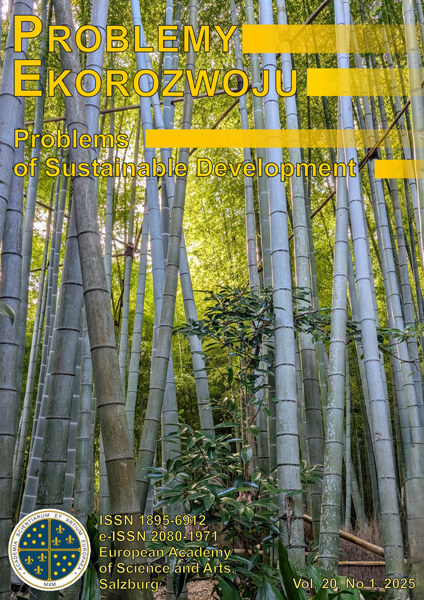Sztuczna inteligencja w naukowym i technologicznym paradygmacie gospodarki światowej
Dmytro Lukianenko
Kyiv National Economic University named after Vadym Hetman (Ukraina)
Anastasiia Simakhova
anastasiia.simakhova@npp.nau.edu.uaNational Aviation University (Ukraina)
Abstrakt
W artykule zbadano wpływ technologii sztucznej inteligencji (AI) na globalny zrównoważony rozwój. Sztuczna inteligencja wpływa na wszystkie trzy filary zrównoważonego rozwoju: gospodarczy, społeczny i środowiskowy. Na podstawie uogólnień prac naukowych i miarodajnych ocen ekspertów wykazano, że wpływ ten jest niejednoznaczny. Zwiększając możliwości technologiczne i zwiększając efektywność biznesu, administracji publicznej oraz świadczenia usług administracyjnych i społecznych, sztuczna inteligencja stwarza szereg problemów społeczno-gospodarczych, przede wszystkim na rynku pracy, gdzie setki zawodów ulegają dyskredytacji i mogą zniknąć. Potwierdzono, że niemal wszystkie sektory gospodarki, w tym edukacja i medycyna, podlegają wpływowi sztucznej inteligencji na szeroką skalę. AI jest w stanie zoptymalizować wykorzystanie zasobów i zwiększyć efektywność energetyczną, redukując odpady, wpływając tym samym na środowiskowy filar zrównoważonego rozwoju. Celem artykułu jest systematyczne badanie krajobrazu intelektualnego i technologicznego gospodarki światowej wraz z przekrojową analizą jej kluczowych wskaźników z wykorzystaniem algorytmu Kohonena. Autor umieścił sztuczną inteligencję w paradygmacie technologicznym XXI wieku. Jeśli postęp naukowy w materiałoznawstwie, energetyce i informatyce matematycznej doprowadził do transformacji cyfrowej wraz z pojawieniem się Przemysłu 4.0, to w synergii z technologiami bio- i kwantowymi sztuczna inteligencja utworzy Przemysł 5.0, tj. zasadniczo inteligentną gospodarkę. Aby odtworzyć obecny globalny krajobraz intelektualny i technologiczny, w badaniu wykorzystano algorytm Kohonena z pakietem Deductor Studio do analizy 128 krajów według 5 wskaźników. Modelowanie pozwoliło na pogrupowanie ich w 5 skupień, co umożliwia realną analizę porównawczą. Podobne modelowanie z wdrożeniem wskaźnika AI (liczba robotów na 10 000 mieszkańców) dla 18 krajów pozwoliło na pogrupowanie ich w 3 klastry według poziomu gotowości rządów i społeczeństwa do interakcji z AI.
Słowa kluczowe:
technologie cyfrowe, technologie kwantowe , biotechnologia, sztuczna inteligencja, Przemysł 5.0, inteligentna gospodarka, zrównoważony rozwójBibliografia
ALY H., 2022, Digital transformation, development and productivity in developing countries: is artificial intelligence a curse or a blessing? Review of Economics and Political Science, 7(4): 238-256, https://doi.org/10.1108/REPS-11-2019-0145.
DOI: https://doi.org/10.1108/REPS-11-2019-0145
Google Scholar
ANTONIUK et al., 2021, Digital economy. The impact of ICT on human capital and the formation of competencies of the future, KNEU, Ukraine
Google Scholar
BBC, 2016, Yuval Noah Harari: ‘We are probably one of the last generations of Homo sapiens’ https://www.bbc.com/news/av/uk-37171171 (22.05.2024)
Google Scholar
CHEN L., CHEN P., LIN Z., 2020, Artificial Intelligence in Education: A Review, IEEE Access, 8, 75264-75278, https://doi.org/10.1109/ACCESS.2020.2988510.
DOI: https://doi.org/10.1109/ACCESS.2020.2988510
Google Scholar
CISCO, 2023, Digital Readiness Index, https://www.cisco.com/c/en/us/about/csr/research-resources/digital-readiness.html (22.05.2024).
Google Scholar
FEDERSPIEL F, MITCHELL R, ASOKAN A, UMANA C, MCCOY D., 2023, Threats by artificial intelligence to human health and human existence, BMJ Glob Health, 8(5): e010435, https://doi.org/10.1136/bmjgh-2022-010435.
DOI: https://doi.org/10.1136/bmjgh-2022-010435
Google Scholar
GOODMAN M., 2015, Future crimes, Doubleday, USA
Google Scholar
HATZIUS J., BRIGGS J., KODNANI D.,PIERDOMENICO G., 2023, The Potentially Large Effects of Artificial Intelli-gence on Economic Growth, https://static.proder360.com.br/2023/03/Global-Economics-Analyst_-The-Potentyally-Large-Effects-of-Artificial-Intelligence-on-Economic-Growth-Briggs_Kodnani.pdf (22.05.2024).
Google Scholar
HWANG G.-J., CHIEN S.-Y., 2022, Definition, roles, and potential research issues of the metaverse in education: An artificial intelligence perspective, Computers and Education: Artificial Intelligence, 3,
Google Scholar
https://doi.org/10.1016/j.caeai.2022.100082.
DOI: https://doi.org/10.1016/j.caeai.2022.100082
Google Scholar
IMD, 2023, World Digital Competitiveness Ranking, https://www.imd.org/centers/wcc/world-competitiveness-center/rankings/world-digital-competitiveness-ranking/ (22.05.2024).
Google Scholar
INDSET A., 2021. The Quantum Economy, ArtHuss, Ukraine
Google Scholar
JUNGWIRTH D., HALUZA D., 2023. Artificial Intelligence and the Sustainable Development Goals: An Exploratory Study in the Context of the Society Domain, Journal of Software Engineering and Applications, 16 91-112, https://doi.org/10.4236/jsea.2023.164006.
DOI: https://doi.org/10.4236/jsea.2023.164006
Google Scholar
KOGUT et al., 2019, Cybersecurity of the Digital Economy for Business Owners, Kyiv, Ukraine.
Google Scholar
KOHONEN T., 2001, Self-Organizing Maps, 3rd ed., Springer, Germany.
DOI: https://doi.org/10.1007/978-3-642-56927-2
Google Scholar
KOLOT A.M. et al., 2023, The ecosystem of human resources of organizations as a concept and applied platform of hu-man-centeredness, Problems of Economics, 3(57): 282-291.
DOI: https://doi.org/10.32983/2222-0712-2023-3-282-294
Google Scholar
KOLOT A.M., 2024, Ecosystemicity as an imperative of sustainable human development, preprint, KNEU, Ukraine.
Google Scholar
KOLOT A.M., GERASYMENKO O.O., SHEVCHENKO A.S., 2023, New challenges for the theory and practice of human capital in the context of the formation of ‘Industry 4.0’: competence aspect, Economy and society, 53: 15.
Google Scholar
LUKIANENKO D., STRELCHENKO I., 2021, Neuromodeling of features of crisis contagion on financial markets be-tween countries with different levels of economic development, Neuro-Fuzzy Modeling Techniques in Economics, 10: 136-163, http://doi.org/10.33111/nfmte.2021.136.
DOI: https://doi.org/10.33111/nfmte.2021.136
Google Scholar
LUKIANENKO D.H., MATVIYCHUK A.V., LUKIANENKO L.I., DVORNYK I.V., 2023, University competitiveness in the knowledge economy: a Kohonen map approach, CEUR Workshop Proceedings, 3465: 236-250, https://ceur-ws.org/Vol-3465/paper23.pdf.
Google Scholar
MHLANDA D., 2023, Artificial Intelligence and Machine Learning for Energy Consumption and Production in Emerging Markets: A Review, Energies, 16(2): 745, https://doi.org/10.3390/en16020745.
DOI: https://doi.org/10.3390/en16020745
Google Scholar
NYAMESHCHUK G.V., 2021, Institutional and regulatory system of intellectualization of the global economy, Kyiv, Ukraine
Google Scholar
OXFORD INSIGHTS, 2023, Government AI Readiness Index 2023, https://oxfordinsights.com/ai-readiness/ai-readiness-index/ (22.05.2024).
Google Scholar
PORTULANS INSTITUTE, 2023, Network Readiness Index 2023, https://networkreadinessindex.org/.
Google Scholar
PYLYPIV I., 2024, The confidence of white-collar workers is melting before our eyes. Why did artificial intelligence become the central topic of Davos?, https://www.epravda.com.ua/publications/2024/01/22/709013/ (22.05.2024).
Google Scholar
SCHEVCHENKO et al., 2023, Strategy for the development of artificial intelligence in Ukraine, IPSI, Ukraine.
Google Scholar
SIMAKHOVA A., 2022, Post-War Socialization of the Economy: Ukrainian and European Security, Challenges to na-tional defence in contemporary geopolitical situation, 2022(1), 71-75, https://doi.org/10.47459/cndcgs.2022.9.
DOI: https://doi.org/10.47459/cndcgs.2022.9
Google Scholar
SKINNER C., 2018, Digital Human: The Fourth Revolution of Humanity Includes Everyone, Marshall Cavendish Interna-tional (Asia), Singapore.
Google Scholar
STANFORD UNIVERSITY, 2023, AI Index Report Measuring trends in AI, https://aiindex.stanford.edu/report/ (22.05.2024).
Google Scholar
UN, 2024, The 17 Goals, https://sdgs.un.org/goals (16.06.2024)
Google Scholar
UNDP, 2021, Global Knowledge Index 2021, https://www.undp.org/sites/g/files/zskgke326/files/migration/arabstates/GKI-Report-2021---CPs-3_Full_compressed.pdf (22.05.2024).
Google Scholar
WIPO, 2023, Global Innovation Index, https://wipo.int/global_innovation_index/en/ (22.05.2024).
Google Scholar
WORLD BANK, 2022, Individuals using the Internet, % of population, https://data.worldbank.org/indicator/IT.NET.USER.ZS (22.05.2024).
Google Scholar
WORLD BANK, 2023, Research and development expenditure % of GDP, https://data.worldbank.org/indicator/GB.XPD.RSDV.GD.ZS (22.05.2024).
Google Scholar
ZARIFHONARVAR A., 2023, Economics of ChatGPT: a labor market view on the occupational impact of artificial intel-ligence, Journal of Electronic Business & Digital Economics, https://dx.doi.org/10.2139/ssrn.435092.
DOI: https://doi.org/10.2139/ssrn.4350925
Google Scholar
Autorzy
Dmytro LukianenkoKyiv National Economic University named after Vadym Hetman Ukraina
Autorzy
Anastasiia Simakhovaanastasiia.simakhova@npp.nau.edu.ua
National Aviation University Ukraina
Statystyki
Abstract views: 512PDF downloads: 301









